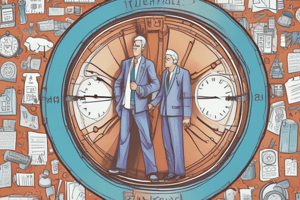Podcast
Questions and Answers
What is the primary benefit of improved interpersonal relationships as a result of self-management?
What is the primary benefit of improved interpersonal relationships as a result of self-management?
- Increased patient satisfaction
- Improved work performance
- Decreased stress and anxiety (correct)
- Enhanced professional development
Which type of energy focuses on maintaining concentration and flexibility in navigating complex issues?
Which type of energy focuses on maintaining concentration and flexibility in navigating complex issues?
- Physical energy
- Emotional energy
- Mental energy (correct)
- Spiritual energy
Which of the following is NOT an example of an external time and energy distraction?
Which of the following is NOT an example of an external time and energy distraction?
- Inadequate policies and procedures
- Setting personal goals (correct)
- Ineffective delegation of tasks
- Lack of clear communication
Which of the following is NOT a direct benefit of self-management?
Which of the following is NOT a direct benefit of self-management?
Which type of energy is most directly associated with reflecting on personal values and purpose?
Which type of energy is most directly associated with reflecting on personal values and purpose?
Which of the following is an example of an external time and energy distraction that directly impacts communication?
Which of the following is an example of an external time and energy distraction that directly impacts communication?
What type of energy is being utilized when a nurse contemplates career options in a quiet setting?
What type of energy is being utilized when a nurse contemplates career options in a quiet setting?
Which of the following is a key factor that self-management helps to reduce?
Which of the following is a key factor that self-management helps to reduce?
What psychological obstacle may prevent an individual from developing productive work habits due to concerns about chaos?
What psychological obstacle may prevent an individual from developing productive work habits due to concerns about chaos?
Which of the following factors is NOT mentioned as a characteristic of health care environments?
Which of the following factors is NOT mentioned as a characteristic of health care environments?
The fear of which situation can lead a nurse to withdraw from a new opportunity in hospice care?
The fear of which situation can lead a nurse to withdraw from a new opportunity in hospice care?
What is a key reason for the importance of managing time effectively in health care?
What is a key reason for the importance of managing time effectively in health care?
Which psychological obstacle may arises from the concern of losing creativity?
Which psychological obstacle may arises from the concern of losing creativity?
Which factor contributes to the complexity of managing time in health care settings?
Which factor contributes to the complexity of managing time in health care settings?
What is a common fear that may hinder a person from taking decisive action in their career?
What is a common fear that may hinder a person from taking decisive action in their career?
Which of the following is NOT listed as a psychological obstacle to productive work habits?
Which of the following is NOT listed as a psychological obstacle to productive work habits?
Which of the following is NOT an example of an internal distraction?
Which of the following is NOT an example of an internal distraction?
What is the primary focus of planning in time management?
What is the primary focus of planning in time management?
Which of the following is a recommended strategy for overcoming procrastination?
Which of the following is a recommended strategy for overcoming procrastination?
Which approach is used for setting priorities in time management?
Which approach is used for setting priorities in time management?
What practice is advised to avoid the 'stacked desk syndrome'?
What practice is advised to avoid the 'stacked desk syndrome'?
Which of the following actions is encouraged when feeling overwhelmed?
Which of the following actions is encouraged when feeling overwhelmed?
What is the term for concentrating on one activity until it is accomplished?
What is the term for concentrating on one activity until it is accomplished?
Which technique can help manage meeting times effectively?
Which technique can help manage meeting times effectively?
Flashcards
Clear Goals
Clear Goals
The act of having a clear sense of what needs to be achieved.
Prioritization
Prioritization
The process of ranking tasks based on their importance.
Constant Chaos
Constant Chaos
A pervasive state of disarray and disorganization.
Fear of Downtime
Fear of Downtime
Signup and view all the flashcards
Need to be a Caretaker
Need to be a Caretaker
Signup and view all the flashcards
Fear of Failure
Fear of Failure
Signup and view all the flashcards
Fear of Success
Fear of Success
Signup and view all the flashcards
Fear of Disrupting the Status Quo
Fear of Disrupting the Status Quo
Signup and view all the flashcards
Mental Energy
Mental Energy
Signup and view all the flashcards
Spiritual Energy
Spiritual Energy
Signup and view all the flashcards
Emotional Energy
Emotional Energy
Signup and view all the flashcards
Physical Energy
Physical Energy
Signup and view all the flashcards
External Time & Energy Distractions
External Time & Energy Distractions
Signup and view all the flashcards
Self-Management
Self-Management
Signup and view all the flashcards
Critical Thinking
Critical Thinking
Signup and view all the flashcards
Benefits of Self-Management
Benefits of Self-Management
Signup and view all the flashcards
Time Management
Time Management
Signup and view all the flashcards
Planning in Time Management
Planning in Time Management
Signup and view all the flashcards
Organizing in Time Management
Organizing in Time Management
Signup and view all the flashcards
Implementation in Time Management
Implementation in Time Management
Signup and view all the flashcards
Procrastination
Procrastination
Signup and view all the flashcards
ABC Approach to Prioritization
ABC Approach to Prioritization
Signup and view all the flashcards
Pareto Principle in Time Management
Pareto Principle in Time Management
Signup and view all the flashcards
Continuum Approach to Prioritization
Continuum Approach to Prioritization
Signup and view all the flashcards
Study Notes
Chapter 25: Managing Time for High Self-Performance
- Managing time in healthcare is crucial for high performance, particularly in high-acuity environments.
- Complex healthcare settings involve high-acuity patients, engaged family members, rapidly evolving technology, and tight spaces.
- Healthcare work often requires rapid transitions between locations and multiple disciplines working concurrently, creating unique challenges in time management.
- Balancing work and personal life is essential in this demanding environment.
Incredibly Complex Health Care Environments
- High-acuity patients require significant attention and resources.
- Vigilant and knowledgeable family members often have significant input and concerns.
- Rapid advancements in technology create a continuously evolving environment.
- Limited space in healthcare settings often necessitates efficient use of time.
- Interaction with patients is often constrained by the specific circumstances of treatment and care.
- Different disciplines working in parallel, sometimes across multiple locations, create coordination challenges.
- Transitioning patients requires precise and swift coordination across locations and specialties.
Psychological Obstacles to Productive Work Habits
- Unclear goals/priorities hinder productivity.
- Constant chaos creates difficulty focusing.
- Fear of downtime/need to be a caretaker diminishes productivity.
- Fear of failure, success, disrupting the status quo, or completion negatively affect performance.
- Need for perfection and fear of losing creativity can result in procrastination and avoiding tasks.
- Recognizing and addressing these obstacles can improve productivity by developing and managing more productive habits.
Critical Thinking Question 1
- A nurse considering a hospice care position withdrew her application due to the family's disfavor.
- The obstacle was the fear of disrupting the status quo.
Benefits of Self-Management
- Implementing a collaborative structure within a healthcare environment improves patient outcomes.
- Applying new skills enhances job satisfaction and the perception of accomplishment.
- Increased presence and engagement in work interactions improve interpersonal relationships.
- Increased self-awareness and diligence improve one's sense of direction and purpose.
- Proactive health management and reduced anxiety and improved self-esteem results from goal accomplishment and decreased workplace stress.
Four Sources of Energy Required to Perform Our Best
- Physical energy is essential to a highly productive, energizing work life.
- Mental energy is the ability to sustain focus and effectively address broad and narrow issues.
- Spiritual energy involves reflecting on values and purpose.
- Emotional energy involves successfully managing emotions.
Critical Thinking Question 2
- A nurse faces a choice between advanced practice education and a research assistant position.
- The reflection and planning process utilized was focused on spiritual energy.
Examples of External Time & Energy Distractions
- Interruptions (visitors, calls, etc.) affect productivity.
- Lack of information and ineffective communication hinder progress.
- Poor policies and procedures impede work efficiency.
- Conflicting priorities or poorly cooperating colleagues create obstacles.
Examples of Internal Time & Energy Distractions
- Procrastination wastes time.
- Inadequate planning for tasks, projects, and commitments impedes efficiency.
- Inability to say “no” to unnecessary requests/tasks is a form of procrastination.
- Indecisiveness or inability to prioritize leads to difficulty reaching goals.
- Daydreaming and unrelated thoughts create detours.
- Attempting too many tasks at once creates errors and delays.
Time Management Strategies: Planning
- Planning is vital for successful time management.
- Identifying priorities before starting work is crucial.
- Using different approaches in task prioritization (ABC, Pareto Principal, etc.) can help manage work efficiently.
- Structuring daily tasks through scheduling or to-do lists aids in time control.
Time Management Strategies: Organizing
- Personal organization within a work structure is important.
- Avoiding a "stacked desk" syndrome and other distractions is key.
- Concentrating on one task until completion enhances efficiency.
Time Management Strategies: Implementing
- Prioritizing tasks is important.
- Finding extra time often requires creating space/reducing task load.
- Procrastination can be avoided with effective planning.
- Delegating tasks when appropriate is key to efficiency.
- Controlling work interruptions and managing meetings are important practices.
- Saying "no" is essential for clear boundaries and prioritizing tasks.
- Technology can increase efficiency in time management.
- Reward yourself for completing tasks for increased motivation.
Activities for Continued Success
- When overwhelmed, break down tasks/priorities.
- Focus on high-priority activities.
- Avoiding procrastination remains key.
- Maintaining positive, and congruent goals with values enhances self-motivation and direction.
- Self-care activities and rest are crucial for long-term productivity.
- Consistent effort toward overcoming fears is key.
- Avoiding performing easy, unimportant tasks avoids distraction.
Studying That Suits You
Use AI to generate personalized quizzes and flashcards to suit your learning preferences.




